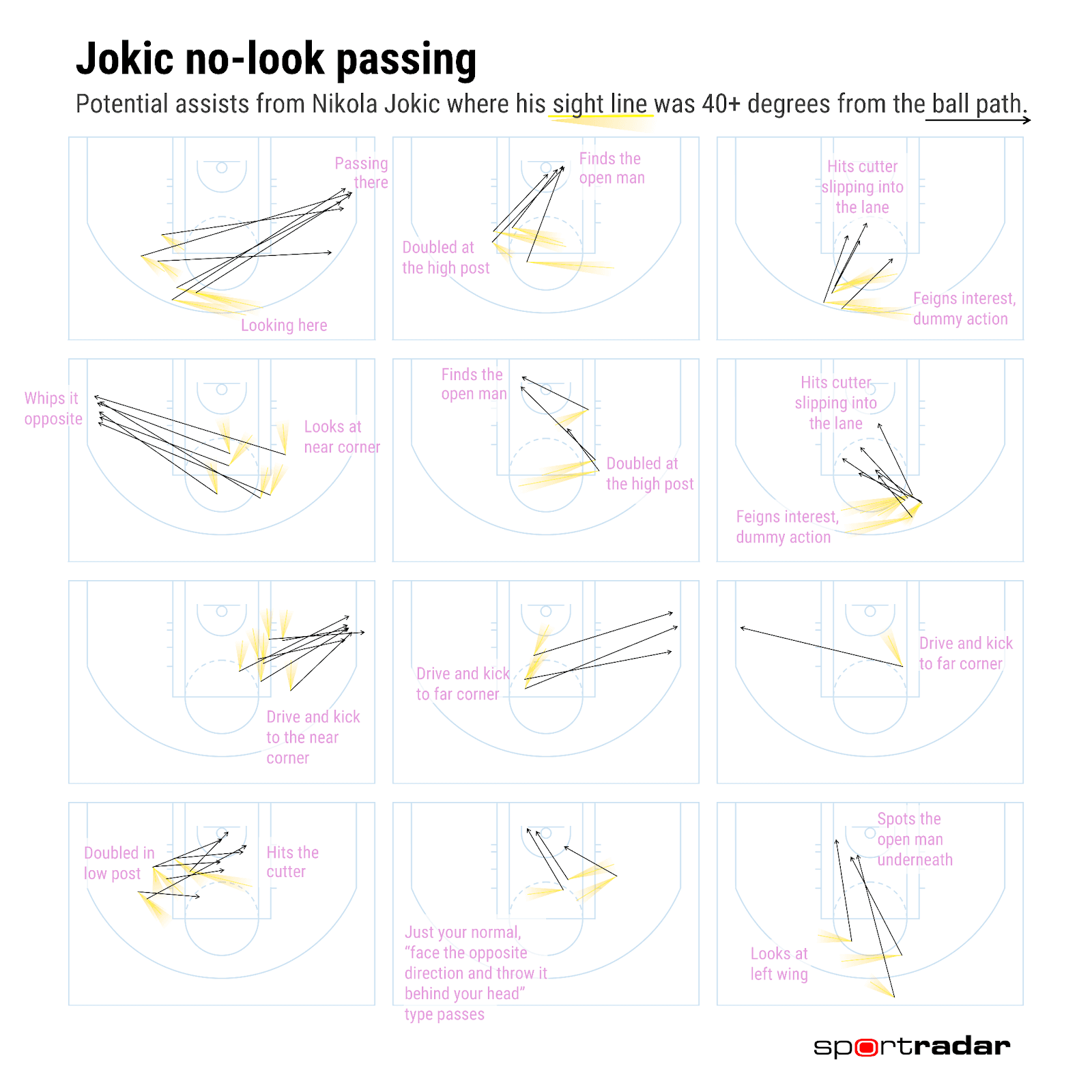Mike Conley sits at his locker, momentarily stumped. He needs a second to consider the question: What’s the smartest thing you’ve ever seen Nikola Jokic do?
Conley’s NBA experience could fill an encyclopedia. Now in his 18th season, the 37-year-old has forgotten more than most players will ever absorb. He’s faced Jokic 40 times. They don’t play the same position, but as a savvy floor general who’s known for settling chaos and organizing offensive sets, Conley understands how challenging it can be to puzzle out some of the elaborate game plans Jokic faces every night.
“There’s been so many, honestly,” he says, then starts describing a Timberwolves-Nuggets game from last November that instantly became the stuff of lore. “He was calling out our play when we’re in mid-play, and we’re like, bro, we can’t run our play because he’s telling everybody, putting people in positions where we can’t run our play.”
Then Conley holds up a finger to signal that he’s got another story, a bit more specific. The memory causes him to shake his head, like someone who knows the story he’s about to tell is both beyond belief and, somehow, par for the course.
“There was a time when I was on defense where I was the low guy on a zone trap situation on the backside. He was at the opposite elbow with his back to me. The previous possession I had helped in on the cut and deflected [Jokic’s pass].” Conley’s smile widens. “So I was like, 'Oh, yeah, I'm gonna be there again.' And as soon as I took a step in to go help on the guy cutting, without looking, he just threw it right across my face to the corner. When he made the shot, it's kind of like one of those things—we've had this chess match going on for years—where I look at him like, ‘You got me.’”
There are several traits that make Jokic the best basketball player in the world: He’s 6-foot-11 and nearly 300 pounds, with pillowy hands, light feet, 3-point range, and a résumé that speaks for itself—three regular-season MVP awards, one ring, and a Finals MVP, all collected without a single All-Star teammate. Jokic’s statistical profile is the reason he led the league in spit takes this season. (He averaged 29.6 points, 12.7 rebounds, 10.2 assists, and 1.8 steals per game. Come on.) As for his career stats, only three players have a higher true shooting percentage, only two players have amassed more triple-doubles, and zero players have a higher PER—in the regular season and the playoffs.
But if you really want to hear people rhapsodize about Jokic, ask them about his brain. It’s an imaginative mainframe capable of processing information at a rate that makes knee-jerk reactions seem like carefully laid plans. “He watches a lot of basketball. People don’t realize that,” Nuggets guard Christian Braun tells me. “He’ll text me about games that are on at night. He’s just, I mean, probably the smartest player that’s ever played.”
Jokic doesn’t fight the game so much as harmoniously concede to its rhythm, flowing through the action like a log down a river. No one boomerangs a defensive scheme back in the other team’s face quicker than he does. At the same time, nobody applies more pressure while dictating the terms of engagement. It’s a one-two punch of proactive and reactive finesse that makes his intelligence singular in a league that’s chock-full of great minds.
Jokic’s PhD in basketball strategy is what makes Denver’s offense one of the most efficient we’ve ever seen: The Nuggets generated a league-best 128.3 points per 100 possessions with Jokic on the court this season. His level of intellect is unquestioned by rivals and well-decorated champions who know cerebral wit when they see it.
“I feel very confident that most centers in the NBA, I can outthink,” Draymond Green told The Athletic before going out of his way to name an outlier. “Maybe not Joker.” Green’s head coach, Steve Kerr, who has attempted to stay one step ahead of Jokic in both the NBA and the Olympics, recently called him the greatest center he’s ever seen: “It goes so far beyond the skill level with Jokic. It’s the demeanor, it’s the competitiveness, it’s the intelligence. He is absolutely one of the smartest players ever.”
While some NBA players hold a hand out to feel for rain, Jokic operates with access to his own Doppler radar, approaching every possession with a reassuring sense of where everyone else is supposed to be and where they’re supposed to go. It’s warp-speed cognition from someone who recognizes patterns in a blip and can anticipate the future. Every night creates a fresh batch of examples that delineate the cat-and-mouse game Jokic plays on both ends: the tactical clairvoyance and micro-adjustments that leave his own teammates in disbelief.
A lot of it’s evident in the fact that, having led the league in passes per game six times in the past seven seasons, Jokic is one of the most generous distributors who’s ever lived. Not for nothing, he’s also coming off a year in which he averaged the most assists of his career. There is no way to calibrate any person’s entire mental capacity, but, calling back to the blind dart Jokic whizzed past Conley’s nose, the no-look dimes are a particularly delightful place to start.
According to Sportradar, this season, Jokic recorded 143 potential assists and 89 actual assists when his line of sight was at least 40 degrees different from the path of his pass (both marks rank in the top 10 in the league). They come from myriad locations, flung to outside shooters, weakside cutters, and airborne lob threats.

“I was watching film the other day, and he was bringing the ball up the court,” Nuggets guard Julian Strawther says. “He didn't look at me one time the entire play, and as soon as he crossed half court, he no-looked me, fired it across the court to the other corner. The ball landed right in my lap for a wide-open corner 3. You gotta be on your toes, attentive, and understand that the basketball play he’s trying to make is usually the right one.”
The all-seeing puppeteer, Jokic manipulates defenders with his eyes, rescuing possessions that would otherwise die on the vine. He’ll throw the ball behind his head, chuck an outlet pass 40 feet in the air while staring at the opposite sideline, or flick an alley-oop when the defense is expecting him to spray the ball somewhere else. Most of Jokic’s highlights are as pragmatic as they are incomprehensible:
In rare cases, seeing two steps ahead can get him into trouble because he notices something his teammates can’t. “It’s so funny, too, because Peyton Watson or Jamal [Murray] or whoever, they’ll be like, ‘Man, I’m just running down the court. I’m not open,’” Nuggets interim head coach David Adelman says. “But I know when he turns and looks, he sees … it's like the Beautiful Mind thing. He sees this algorithm that ‘All could work out if everybody just does what I think they should do.’ It’s like, well, yeah, they’re just running down the sideline, man.”
Taking quantification one step further, the website CraftedNBA has attempted to measure basketball IQ by looking at “specific aspects of a player's performance and decision-making within the context of the game.” Their metric blends “game-specific skills and awareness, such as spatial understanding, tactical decisions, and playmaking insights” to ultimately figure out which players read the game better than others. Jokic ranks first. But according to the site’s creator, Daniel Kavanaugh, he also breaks the scale. On the site, Jokic’s assessment tops out at 100, but that number is manually lowered so the full scale is easier to understand. He actually grades out at about 117.
It all happens against complex schemes that change from one play to the next and are solely designed to make his life harder. Jokic must identify and then deconstruct them on the fly. Double-teams are elaborately sprung from different angles and areas of the floor, often deployed under the guise of a smoke screen, with designated spies who are less responsible for their own man than whatever Jokic is doing. “But before they even do it, he always knows exactly where the next play is,” Watson says. “He’s unlike anyone I’ve ever played with.”
As is true in any field, sustained greatness is impossible for NBA players who grow content with their success. According to Adelman, an insatiable hunger for greatness is at the root of Jokic’s genius: “I've never met anybody more curious than him. And I think it's kept him ahead of the curve a little bit with some of the things that we've seen defensively with him. He sees it coming, man. He always has.”
Whether it’s in the post, a catch-and-shoot situation, or guarding a pick-and-roll, Jokic pushes himself to know the ins and outs of every possible scenario on every play. Ever since Adelman joined the Nuggets as an assistant coach eight years ago, whenever he’s introduced a new set or concept, Jokic has always asked, “What’s next?” He games out reactions the defense might have three steps ahead of the play’s trigger and then brainstorms a counter.
Pretty much every superstar sees things others don’t and grasps what’s in front of them a beat faster than others can. But not all of them are interested in cultivating their gift or recognizing how fundamental that is to their achievements. “I just think it’s easy to get lazy with the process when you’ve had basically already one of the greatest careers of all time,” Adelman says. “And I don't see that. I see somebody that’s constantly learning and watching the league and knowing the league never stops moving. And I think, in his mind, he never will either.”
It’s reflected in Jokic’s direct communication style that conveys to teammates and coaches what he likes and doesn’t like without any gray area. He’s honest, blunt, and knows exactly what he’s talking about. “I'm not having to guess if this is something he wants to do, and I mean that in every way,” Adelman says. “If it’s a catch-and-shoot play, which shoulder do you want to go to? What are you feeling comfortable with? What side of the floor does he want us to run this on? Why? There’s always a breakdown to that because in his mind, it’s, ‘OK, let’s run this catch-and-shoot play. Now, if it turns into a back-down or an isolation play, I think I want to be on this side of the floor so I can pass over this shoulder.’ There’s little things like that. ‘Well, I don’t want to be stuck in this situation on this side of the court if the play turns into this.’ And it’s so forward-thinking. It’s three steps ahead all the time.”
Having a photographic memory is key. As years pass, Jokic still remembers the plays an opposing coach will take from one job to the next. Even if they change the name of the set, he spots it. As the Nuggets prepared for a game against Golden State earlier this season, Jokic recognized something Warriors assistant coach Terry Stotts ran as the head coach of the Portland Trail Blazers during a playoff series against the Nuggets in 2019. “I’m not kidding,” Adelman says. “During the walk-through, he said, ‘Oh yeah, that was their old five-out.’”
On defense, Jokic’s foresight often compensates for some of the physical shortcomings that would otherwise keep him at a monumental disadvantage. He isn’t the fastest and can’t jump the highest, but there are so many different situations in every game when his ability to diagnose the offense’s intentions will lead to a Denver stop.
“Sometimes he’ll put you in your spot,” Braun says. “He'll grab your body, move you into your spot. He’s moved me a couple times.”
“If you play against him once, he’s gonna know your tendencies, he’s gonna know what plays you like to run,” Conley says. “Not just what you like to run, but when you like to run them. Like, if it’s out of a timeout, end of the third quarter, a two-for-one situation, he’s like, ‘They’re running this action,’ and he’s telling the whole team. And we’re like, ‘Damn, bro.’ I get it. I get that we run this a lot, but most players don’t even pick up on it.”
Two unfortunate things happen for teams that foul Jokic while he’s shooting: (1) He goes to the free throw line, where he’s a career 82.4 percent shooter, and (2) he gets to hear what play the other team is about to run and tell his teammates what it is.
It happens pretty much every game; here’s one instance against the Mavericks, where, to prevent Luka Doncic from coming off a pin-down, Jokic brackets him with Braun and sends him to the opposite side of the floor, blowing up a set play before it gets off the ground:
Or how about this play in crunch time against the San Antonio Spurs, where Jokic knows Chris Paul wants to throw a lob to Victor Wembanyama, so before the referee even gives CP the ball, he bumps Wemby off the spot, forcing a Spurs audible that helps turn a potential dunk into a turnover:
And here Jokic is telling Russell Westbrook where Fred VanVleet wants to inbound the ball, nearly forcing a five-second violation and then creating an eventual Rockets turnover:
None of these plays is a coincidence. They emerge from a career-long continuum that combines experience with gumption. There are endless examples, with many coming in some of the most important moments in franchise history. “He did it in the Finals. He did it against Miami,” says former Nuggets forward Jeff Green. “I remember him telling Bruce Brown to invert in a different position where he can get the switch and deny a pass, which led to them getting away from their action.” Nuggets guard Jalen Pickett recalls another play against the Lakers in last year’s playoffs, shortly before Jamal Murray hit a game-winning jumper. “He’s literally telling people, like, right then what they’re gonna run, right at the end of the game. So then we get there, and he jumps up on the pick-and-roll super early because he knows exactly what the play is. … Pushes them out, we end up getting a stop.”
Jokic did not graduate from Harvard University, but his profundity extends beyond an X’s and O’s framework. Before every season, the NBA will hold clinics with every team to share official points of emphasis for referees that the competition committee voted for, along with areas of concern the league is keeping an eye on. Denver held its clinic with Monty McCutchen, the NBA’s head of development and training for referee operations, in Abu Dhabi, where they traveled to play two exhibition games against the Boston Celtics.
These meetings give players a chance to question the rule book, to confirm and debate the interpretation of certain practices. Jokic took the opportunity to ask about the Zaza rule, which was enacted to punish defenders who make reckless closeouts that don’t allow jump shooters to land without fear of injury.
What Jokic wanted to know was why, as someone who also leaves the ground and is in danger of landing on a defender’s foot, he doesn’t receive the same level of protection when attempting one of his floaters in the paint. “People land under him a lot,” Watson said. “So he’s like, ‘I need the same exact protection as you guys have for the 3-pointer,’ which is fair. He’s just always thinking of ways to benefit the team.”
McCutchen’s response was a practical shade of gray. “One of the components of a reckless closeout is ‘Do you lose your momentum from a distance because you’re closing out so hard that you can't maintain, and then you take the landing space out?’” McCutchen says. That’s obviously more likely to happen in open space, where a defender is closing out from 10 feet away, than in congested areas like the paint.
But, in McCutchen’s view, Jokic still had a point. “The rule is the same. The conditions that create the rule are not always the same,” McCutchen says. “That doesn't mean it’s never met, and I think that that’s a fair question to ask.”
Jokic is also a master at gamesmanship. Sometimes that means finding different ways to milk the clock, whether that’s pretending to tie his shoe, “walking the dog,” or holding the ball until four seconds elapse from a five-second count. He’s obviously not the only player who tries these things, but the league responded this year by “empowering referees to make sure that the game was played with the proper flow and that the game was not delayed and the game was not gamed,” McCutchen says. That means when a player is intentionally slow to inbound the ball, a referee can start their five-second count even before it’s in the inbounder’s hands or discipline the team with a delay-of-game penalty.
Other times, it’s the exact opposite: Jokic knows that the official, by rule, has to give him the ball as soon as he’s ready to inbound it from the sideline, so he constantly rushes over and demands it. “How many dunks have we gotten over the years where he just football fires the ball to somebody down the court, and the rest of the defense is still getting back, trying to set themselves?” Adelman says. “The first time he did it, I think the referee was shocked because guys don’t run over there and try to get the ball out. Usually, they look at the coach, they’re looking for a set play, and that dude figured it out.”
According to McCutchen, the caveat people don’t realize is that this rule applies only to the first nine minutes and 59 seconds of every quarter. After that, “I have to take the time as an official to look up to see if there’s going to be substitutes because the rule calls for ‘a reasonable amount of time,’” he explains. “That doesn’t mean I’m waiting and waiting and waiting and waiting. It does mean that I’m not just concentrating on Nikola. … I have to scan bench one and bench two to see if a coach is calling for a substitute.”
Still, Jokic is able to catch opponents off-balance, whether it’s during a lazy night in January or a critical spot in May, when scoring baskets is akin to pulling teeth. “Shit, he did it in the playoffs a couple times the year we won [the championship], where we got dunks and, you know, in these really tight, slow-paced games, if you get baskets like that in games that big, it’s enormous,” Adelman says. “I bet we’ve scored at least 50 dunks the last five years that way, and I guarantee, if you look back, I bet 30 times out of 50 the other coach called timeout because he was like, ‘Fellas! Get back! He’s gonna do this every single time!’”
With three games left in the regular season, the Nuggets fired head coach Michael Malone and general manager Calvin Booth, a stunning turn that can still be interpreted one of two ways: (1) gloomy fatalism (Denver did not believe it could make a playoff run and wanted to get rid of Malone and Booth sooner rather than later) or (2) the exact opposite (Nuggets president Josh Kroenke had enough reason to think an ugly in-house feud that directly influenced who played and who didn’t was enough to derail a potential Finals run).
Complacency is not an option with so much at stake. Jokic’s prime is too special to waste. And if any player alive can lead his teammates through the psychological trenches of a playoff series—even against a stacked, defensively tenacious juggernaut like the Los Angeles Clippers or, should Denver advance, the 68-win Oklahoma City Thunder (a team that signed Isaiah Hartenstein in free agency in part to combat the Nuggets)—it’s Jokic. Even in an unforgiving conference that overflows with championship ambition, his intuition supplies hope. Every team with Jokic on it either has an insurmountable advantage or, at the very least, a puncher’s chance.
Players who ascend to superstardom reach it because they’re able to take what they want, when they want it. Jokic could behave that way, but he prefers to make the correct and most advantageous decision every single time the ball touches his hands, regardless of which teammate is involved.
Much like LeBron James, Larry Bird, Kevin Garnett, Chris Paul, or any other basketball savant who comes to mind, Jokic isn’t afraid to walk the plank on a possession and then, before he reaches the edge—with the shot clock in single digits and a steep drop to the bottom staring him in the face—lift his team, unscathed, to a critical instant of relief. It’s basketball nirvana, a geyser of eureka moments that blend together with profound value.
Crucially, Jokic’s brilliance is unassuming. It’s a team sport, after all. He understands the power of connection and the priceless role a bond built on trust can have among players and coaches who don’t want to let him down. It’s as wholesome as it is ingenious.
“Even the way he sits in the locker room and talks to his teammates, it really is like one of your friends back in the day, where you're like, ‘Man, that guy’s smart. Like that dude is … there’s a feel to that guy. Like, if he’s talking, I’m gonna listen,” Adelman says. “And he’s like that in everything, every way. I don’t want to go too far, but it’s really true.”
Jokic’s temperament is foundational to how the Nuggets carry themselves; it lets them exhale knowing someone on their side sees, understands, and thinks about basketball with a clarity the other side may not be able to match.
“His IQ and persona brings a certain toughness to us,” Adelman says. “I think there is a comfortability in the locker room that we got the smartest guy in the league. He’s so natural the way he moves around … because he knows. He’s not cocky, but he sure as hell knows that he’s the smartest guy in the room.”


